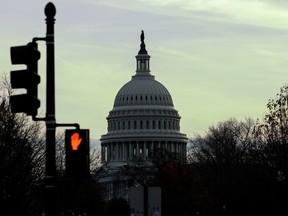The United States Congress is facing a deadline to reach a deal on funding the government after the House of Representatives voted down the latest version of a spending bill, despite support from President-elect Donald Trump.
A Deadline Approaches
The 174-235 vote late on Thursday sets up a high-stakes game between House Republicans and Democrats as they scramble to pass a new bill before a Friday night deadline. The failed deal would have extended government spending to March 14, sent billions of dollars to communities affected by natural disasters, and provided aid to farmers.
Trump’s Involvement Sparks Controversy
President-elect Trump has been actively involved in the negotiations, using his social media platform to pressure House Republicans to reject the initial bipartisan bill. Trump criticized the bill as "terrible" and bloated with unnecessary spending measures, which sparked a backlash from Democrats who accused him of sabotaging the negotiations.
Musk Weighs In on Congressional Leadership
In a series of tweets, Elon Musk, one of the most influential voices in tech, called for House Republicans to reject the initial bill, labeling it "terrible" and bloated with unnecessary spending measures. This sparked a heated debate over whether Musk’s involvement was legitimate or simply an attempt to exert his influence on Capitol Hill.
A Shutdown Would Have Devastating Consequences
A government shutdown would have severe consequences for federal programs, including those supporting military personnel, veterans, and low-income families. It would also put at risk critical infrastructure projects, such as highway construction and airport upgrades.
The Debt Ceiling Debate Continues
At the heart of the debate is the debt ceiling, which currently stands at $31 trillion. The Treasury Department has already begun using "extraordinary measures" to cover new expenditures without breaching the cap, but this temporary fix will only last until January 1, when the next Congress takes office.
Republicans Face Pressure to Raise Debt Ceiling
House Republicans are under intense pressure from their leadership and President-elect Trump to raise the debt ceiling as part of a new spending bill. Failure to do so would put the country at risk of defaulting on its debts, which could have catastrophic consequences for the global economy.
Democrats Attack Proposed Bill as ‘Not Serious’
House Democratic leader Hakeem Jeffries criticized the proposed bill, calling it "not serious" and accusing extreme MAGA Republicans of driving the country towards a government shutdown. A shutdown would be a disaster for Democrats, who are already facing an uphill battle in the upcoming midterm elections.
What’s Next?
The fate of the spending bill remains uncertain as Congress struggles to reach a deal before the deadline. Will House Republicans and Democrats find common ground, or will the country teeter on the brink of a government shutdown? The outcome is far from clear, but one thing is certain: the stakes are high.
Related Articles
- CEOs Rush to Bend Knee to Donald Trump
- U.S. Oil Sector Pushes Trump to Spare it from Tariffs
- Trump Tells EU to Buy U.S. Oil and Gas or Face Tariffs
Join the Conversation
Share your thoughts on the proposed spending bill and the potential government shutdown in the comments below.
Comments
You must be logged in to join the discussion or read more comments.
Create an Account | Sign in
Postmedia is committed to maintaining a lively but civil forum for discussion. Please keep comments relevant and respectful.
Comments may take up to an hour to appear on the site. You will receive an email if there is a reply to your comment, an update to a thread you follow or if a user you follow comments. Visit our Community Guidelines for more information.
Trending
- A cut in January, then a pause: What jobs data mean for Bank of Canada and interest rates
- History is foreshadowing the worst of times for markets
- Investor
- How far could Trump go using ‘economic force’ to try and annex Canada?
- News
- Bundled pricing: How the best mortgage rates increasingly come with strings attached
- Mortgages
- Howard Levitt: Trudeau’s exit a reminder of the perils of wrongful resignation
- Work
Read Next
Featured Local Savings




